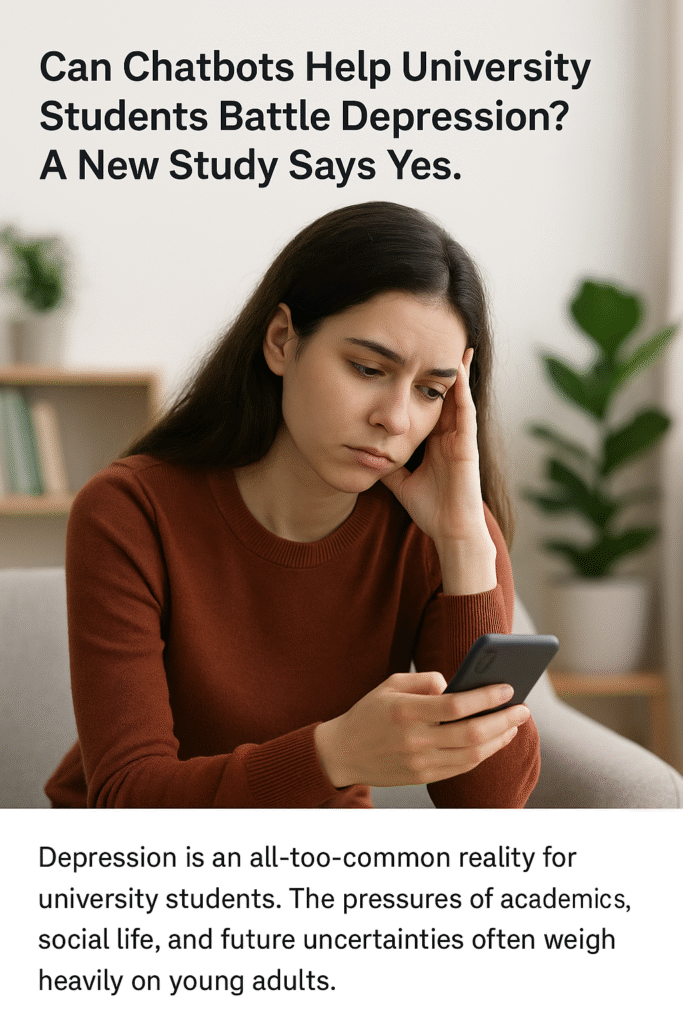Depression is an all-too-common reality for university students. The pressures of academics, social life, and future uncertainties often weigh heavily on young adults. While therapy is effective, many students struggle to access professional help due to costs, stigma, or time constraints.
In recent years, mobile therapy chatbots have emerged as a promising tool to fill this gap (https://mental.jmir.org/2017/2/e19/). These AI-driven apps can simulate conversations, offer coping strategies, and provide emotional support — all at the tap of a finger. But, here’s the catch: most studies on chatbot therapy have been short-term (https://pubmed.ncbi.nlm.nih.gov/30897957/), leaving a big question mark on their real-world effectiveness.
The Study: Chatbot Therapy vs. Bibliotherapy
A recent randomized controlled trial conducted with 83 university students aged 19 to 28 sought to address this gap. Researchers wanted to see how effective chatbot therapy is when compared to bibliotherapy — a well-established self-help method using structured reading materials for psychological support (https://psycnet.apa.org/record/2004-95164-009).
Participants were divided into two groups:
- Chatbot Therapy Group (n = 41): Received therapy through a newly developed chatbot.
- Bibliotherapy Control Group (n = 42): Received a minimal level of self-help reading material.
Over a 16-week period, the students’ depression, anxiety, and emotional states were assessed using validated questionnaires like PHQ-9, GAD-7, and PANAS (https://pubmed.ncbi.nlm.nih.gov/11556941/, https://pubmed.ncbi.nlm.nih.gov/16717171/). Additionally, participants’ satisfaction and perceived connection to the intervention were measured using the Client Satisfaction Questionnaire (CSQ-8) and the Working Alliance Inventory-Short Revised (WAI-SR) (https://psycnet.apa.org/record/2006-02230-002).

What Did They Find?
- Chatbots Reduced Depression and Anxiety:
Students who used the chatbot showed a significant reduction in depression symptoms over time (F = 22.89; P < 0.01). Anxiety levels (measured by GAD-7) also improved, although the most noticeable changes occurred within the first 4 weeks of the intervention (F = 5.37; P = 0.02). - Chatbots Built a Better Therapeutic Alliance:
One surprising finding was that students in the chatbot group felt a stronger therapeutic connection (WAI-SR scores) compared to the bibliotherapy group (t = 7.29; P < 0.01). This aligns with previous literature suggesting that interactivity and responsiveness in digital interventions can foster emotional engagement (https://psycnet.apa.org/record/1986-98645-001). - Process Matters More Than Content:
Feedback from participants revealed that how the chatbot interacted — its tone, empathy, and responsiveness — was more impactful than just the informational content it provided. This emphasizes that user experience design in mental health apps plays a crucial role in their effectiveness (https://www.researchgate.net/publication/220286280_Establishing_and_Maintaining_Long-Term_Human-Computer_Relationships). - Dropouts Remain a Challenge:
As with many self-help interventions, maintaining engagement over time was difficult. 24% of participants were lost to follow-up, reflecting a common hurdle in digital mental health interventions (https://www.psychiatryadvisor.com/news/high-clinical-trial-attrition-rates-for-depression-intervention-apps/).
Why This Matters
This study adds valuable real-world evidence supporting chatbot therapy as a convenient and interactive self-help option for students battling depression and anxiety. While bibliotherapy is cost-effective and evidence-based, chatbots offer added benefits of personalization and emotional interactivity, which resonate more with tech-savvy young adults.
The Bottom Line
Mobile-based chatbot therapy could be a game-changer for mental health support in university populations. It doesn’t replace professional therapy but serves as an affordable, accessible, and empathetic companion for students who might otherwise face barriers to care.
As chatbot technology continues to advance, its role in mental health care will expand — but long-term, pragmatic trials like this are essential to understanding how best to implement them effectively.
Stay tuned to nichesystema.com for more such updates!


